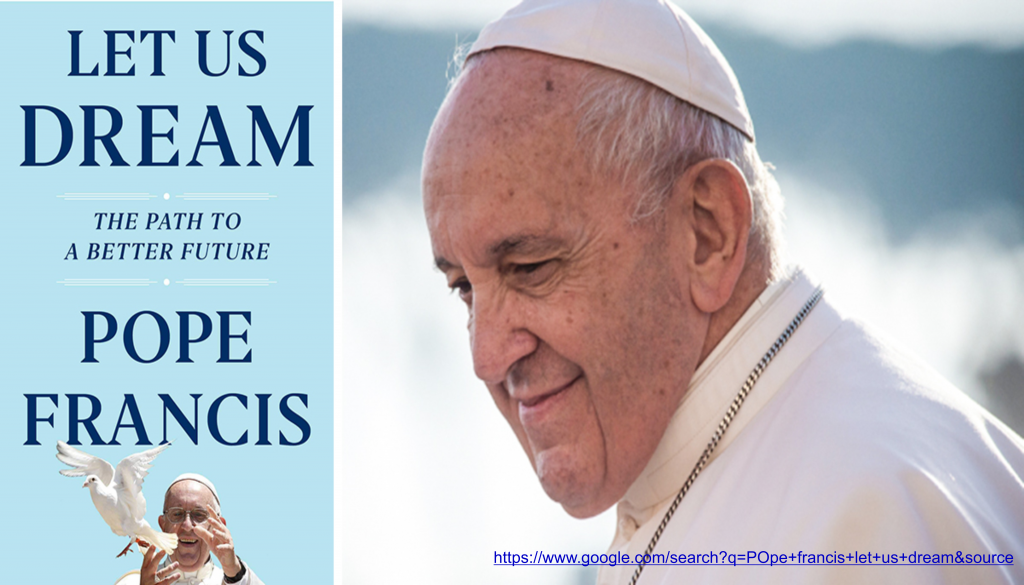In the spirit of Christmas and the New Year, we in Silsilah wish to express solidarity with all especially those who suffer most in this critical time of COVID19. Many things we can share to express solidarity, but we decided to share Solidarity with message of inspiration guided by the new book of Pope Francis, “Let Us Dream: The Path to a Better Future”.
In his book, Let Us Dream: The Path to a Better Future, based on conversations he had with papal biographer Austen Ivereigh, Pope Francis speaks out on the protests against racial injustice, poverty, and the arms trade, saying those Catholics who refuse to join such movements give “a bad example, losing the sense of solidarity and fraternity with the rest of their brothers and sisters.”
The book developed first from a series of exchanges between Ivereigh and the Pope, with Ivereigh emailing Pope Francis with questions and the Pope responding with taped comments. Ivereigh then helped the Pope put the book together.
In the book, Pope Francis treats the coronavirus as a metaphor, saying people all experience their own “Covids,” in the sense of a forced stoppage in their lives that reveals “what needs to change: our lack of internal freedom, the idols we have been serving, the ideologies we have tried to live by, the relationships we have neglected.”
Pope Francis condemns governments who have “mortgaged their people” in response to the coronavirus, and says that we must place human dignity at the very center of our political efforts, with a particular focus on providing all people with “the three Ls of land, lodging, and labour, as well as education and health care” (112). The way we can do this is to move forward according to a process of discernment—a process that is reflected in the three chapter titles, “A Time to See,” “A Time to Choose,” and “A Time to Act.” He applies this See-Judge-Act method.
Pope Francis says that we must look first to the margins to start our processes of discernment: you can’t know poverty from a distance; you have to touch it. To recognise and come close—that’s the first step. The second step consists in responding practically and immediately, because a concrete act of mercy is always an act of justice. But a third step is necessary if we are not to fall into mere welfarism: to reflect on the first two steps and open ourselves to the necessary structural reforms. (113).
“This is a time for pilgrimages” (135). The Church does not have all the answers, even if it has access to the truth: “There is no contradiction between being solidly rooted in the truth and at the same time being open to a greater understanding” (57). What we wait for as we journey are those moments of “overflow,” when God’s mercy spills out and provides us with an unforeseen basis for acting and working together (7).
Let Us Dream contains what is perhaps Pope Francis’ most lucid explanation of the way dialogue should function in the Church, and of special import is the distinction he draws between “contrapositions,” or opposites that can exist in a harmonious tension, and “contradictions,” which are a matter of good and evil or right and wrong. He says, “To see contrapositions as contradictions is the result of mediocre thinking that takes us away from reality” (79). Certainly, the reduction of every disagreement into an epic battle of good versus evil has poisoned public discourse both inside and outside the Church, and has made genuine dialogue a rare thing. We need to hold back, and let contrapositions exist; until we either experience a moment of “overflow” or discern that a path forward is blocked for now.
The last encyclical letter of Pope Francis “Fratelli Tutti” written during the COVID19 time and published on October 4, 2020 can be considered like a basic “philosophy” and “Spirituality” that guided Pope Francis in his mission.
In “Fratelli Tutti” Pope Francis says: As I was writing this letter, the Covid-19 pandemic unexpectedly erupted, exposing our false securities. Aside from the different ways that various countries responded to the crisis, their inability to work together became quite evident. For all our hyper-connectivity, we witnessed a fragmentation that made it more difficult to resolve problems that affect us all. Anyone who thinks that the only lesson to be learned was the need to improve what we were already doing, or to refine existing systems and regulations, is denying reality.
He added, In today’s world, the sense of belonging to a single human family is fading, and the dream of working together for justice and peace seems an outdated utopia. What reigns instead is a cool, comfortable and globalized indifference, born of deep disillusionment concealed behind a deceptive illusion: thinking that we are all-powerful, while failing to realize that we are all in the same boat. This illusion, unmindful of the great fraternal values, leads to “a sort of cynicism. For that is the temptation we face if we go down the road of disenchantment and disappointment… Isolation and withdrawal into one’s own interests are never the way to restore hope and bring about renewal. Rather, it is closeness; it is the culture of encounter. Isolation, no; closeness, yes. Culture clash, no; culture of encounter, yes”.[28]
Yes, the “Culture of Encounter” that is normally translated as “Culture of Dialogue” must be what we have to build in our society and we hope and pray that this Christmas time and the beginning of the New year 2021 will be an occasion to build together the Culture of Dialogue, Path to Peace.
Silsilah Dialogue Movement

